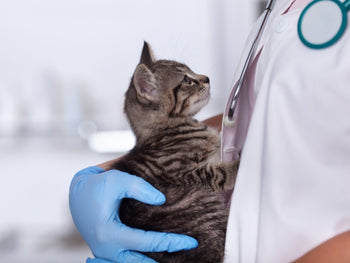Retinopathy and hypertension found in the cats, especially at old ages, are often believed to be the result of hyperthyroidism. And methimazole, which comes from human medicine, is the medical management of hyperthyroidism found in cats.
Middle-aged to geriatric-aged cats tend to suffer from hyperthyroidism. And methimazole – the drug that is used to treat overactive thyroid (hyperthyroidism) occurring in cats is similar as that is used to treat hyperthyroid disease found in humans.
Due to the low incidence of adverse side effects of methimazole compared to those of propylthiouracil, a lot of veterinarians now prefer the course of treatment of over-active thyroid or for the hyperthyroid disease. Also, methimazole is now popularly considered as a drug of choice before any radioactive iodine treatment or thyroid surgery.
Don’t expect this form of medical management to cure the condition! For your cats’ happy life, methimazole is of importance. However, the symptoms cannot disappear once the medication is stopped.
And you need a prescription from your vet to buy methimazole, which is available in a transdermal gel or cream and is also sold per 5mg scored tablet.
Check us out for various cat tips & facts!
Methimazole For Cats – How Fast Does It Work?
How Fast Does It Work?

Why is methimazole prescribed to be given twice a day and a 5mg tablet every 8 to 12 hours a usual initial dose for cats with the hyperthyroid disease? Because it is a very short-action drug that will leave the system within less than a day (approximately 20 hours)!
Methimazole in a transdermal gel or cream that you could rub on your cat’s ear’s interior side. One thing to note when you apply the medication in the transdermal preparation is to wear gloves. For cats with hyperthyroid diseases or normal health condition, the circulation of methimazole is pretty short - from 2.3 hours to 4.7 hours.
What Should You Do If You Want To Give Methimazole To Your Cat?

What should you do if you want to give your cat methimazole? Discussion with your veterinarian is sure to be necessary! There’s nothing wrong with methimazole – just in case you are ready to tolerate a high side-effect rate of up to 20%. If you do not want to get angry when your cats have an adverse reaction to methimazole, tell your veterinarian everything about your cats’ health condition. Whether your furry four-legged pets are nursing or pregnant, or they have an allergy to methimazole, or they have a blood cell disorder, any liver disease, or a weak immune system, make sure to report everything to your vet.
If the commercially available methimazole medications cannot meet the special demand of cats with hyperthyroidism, your vet is likely to prescribe compounded methimazole which is both strong and appropriately sizeable enough for your four-legged friends from a compounding pharmacy. Also, it is not a bad idea to inform him/her of any other medication such as supplements and vitamins your cats may be taking while they are having methimazole.
What Are The Common Side Effects Of Methimazole In Cats?

Even though methimazole gains its popularity due to the lower incidence of side effects compared with propylthiouracil, you should be aware of several of its side effects shown as below:
- Within the first few weeks - Facial Scratches – the result of self-mutilating necks and faces through scratching at a small number of cats (the rate is about 4-8%);
- Within the first 3 months of therapy, a lot of adverse side effects such as Anorexia, Vomiting, and Depression usually occur (the rate is about 10-20%);
- Within the first two months of treatment - Temporary disorders of blood counts are often claimed in approximately10-12% of cats. A very small number of cats are likely to develop these incredibly serious changes in their bone marrow, low white blood cell counts – which help fight infections, or liver dysfunction (elevated ALP, T.bili, upper stomach pain, ALR, dark urine, AST);
- Loss of Appetite – Due to the very bitterness in the taste of methimazole pills;
- Within the first 6 months of treatment or much longer, cats with over-active thyroid tend to develop autoimmune disease (the rate is about 50%);
- Like other medications, methimazole can upset your cats’ digestive tract;
- Joint or muscle pain;
- Bleeding - Cats suffering from bleeding due to the application of methimazole should stop their use of this medicine.
What Should You Do To Protect Your Cats?

If your cats develop any sign of an infection, immediately contact your veterinarian. Unfortunately, in the worst case, if your sick lovely friend is suffering from overactive thyroid (hyperthyroidism), he/she is sure to continue to deteriorate and ultimately pass away from his/her condition, especially if you do not take him/her to your vet office for a thorough examination.
For all diseases, the goal in veterinary medicine is synonymous with treating for a cure. But an ounce of prevention is worth a pound of cure. To save yourself from worrying about Methimazole For Cats – How Fast Does It Work, why not give them frequent check-ups? That way, your cats will continue to be loving and sweet.
How to breathe a sigh of relief that your cats do not need to take methimazole? How to save yourself from thinking about Methimazole For Cats – How Fast Does It Work? Give your cats much more care and love!
Read more healthy cats guide and find fun stuffs on Cattybox!











In response to Brenda’s concern, that seems to the the message, erroneous as it may be. I have given my cat MUCH LOVE AND CARE. Unfortunately she is now about 17 years old, thanks to my love and care, and she has developed this condition; quite common for older cats, much like age related progressive illnesses in humans.
Does your message imply that my cat has hyperthyroidism because she was not given enough love or attention? We take our cat to the vet yearly and in between when she seems sick. Is hyperthyroidism preventable?
Does your message imply that my cat has hyperthyroidism because she was not given enough love or attention? We take our cat to the vet yearly and in between when she seems sick. Is hyperthyroidism preventable?